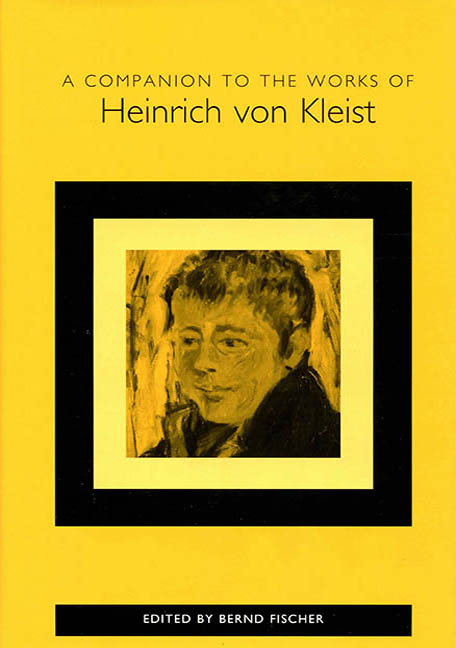Book contents
- Frontmatter
- Contents
- Introduction: Heinrich von Kleist's Life and Work
- Critical Approaches
- Language and Form
- Intellectual Paradigms
- The Facts of Life: Kleist's Challenge to Enlightenment Humanism (Lessing)
- “Betwixt a false reason and none at all”: Kleist, Hume, Kant, and the “Thing in Itself”
- Themes and Motifs
- Notes on the Contributors
- Index
“Betwixt a false reason and none at all”: Kleist, Hume, Kant, and the “Thing in Itself”
from Intellectual Paradigms
Published online by Cambridge University Press: 27 April 2017
- Frontmatter
- Contents
- Introduction: Heinrich von Kleist's Life and Work
- Critical Approaches
- Language and Form
- Intellectual Paradigms
- The Facts of Life: Kleist's Challenge to Enlightenment Humanism (Lessing)
- “Betwixt a false reason and none at all”: Kleist, Hume, Kant, and the “Thing in Itself”
- Themes and Motifs
- Notes on the Contributors
- Index
Summary
The question “What is Enlightenment?” — the subject of a famous debate in the Berlinische Monatsschrift — has been asked again in our own time. In the late eighteenth century the question elicited a variety of responses, most notably from the philosopher Immanuel Kant, who used the question as an opportunity to sum up the thought of his own time and to inspire it in new directions. To the idea of a rationally lived life based on the reasoning human being as the measure of all things, Kant added the crucial notion of “maturity,” a special quality that implied that certain limitations attend the operation of reason in practice. These limitations partly had to do with practical considerations, such as the responsibilities incumbent on government officeholders and civil servants when speaking publicly. But they also arose as a condition of the use of reason generally. Kant thought that there was no choice about these limitations. His philosophy was built on the insight that the use of reason is limited because human beings’ categories of understanding are limited, so that the invocation to use reason in a mature manner was nothing more than a call to use reason within limits found within human beings themselves. In deriving these categories of understanding in his other works, Kant developed a “critical philosophy” based on the differences between theoretical understanding, experimental reasoning based on proofs, and the more open category of judgment — the type of reasoning typical of aesthetic responses to the world.
The return of the question “What is Enlightenment?” to center stage in the humanities in recent times has focused attention on the rational content of technological modernism — an issue first raised by philosophers of the Frankfurt School of social research before and immediately after the Second World War. Specifically, the question that has been asked of the highly technology-reliant democracies of the Western world is what rationally based societies achieve for their citizens.
- Type
- Chapter
- Information
- A Companion to the Works of Heinrich von Kleist , pp. 165 - 188Publisher: Boydell & BrewerPrint publication year: 2003



